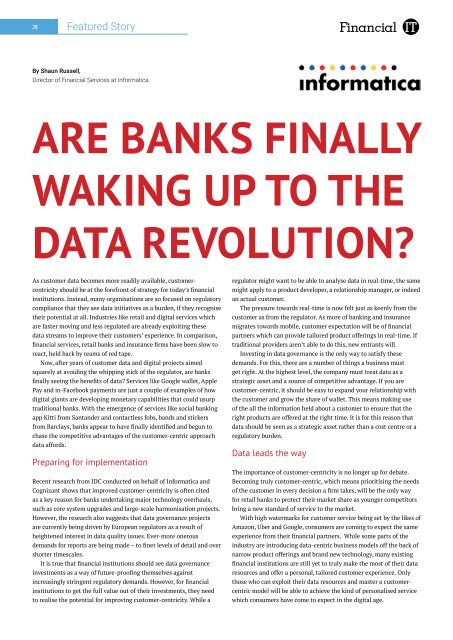Revolutionizing the Financial Markets
With more than 100 000 subscribers of which 70% are banks, Financial IT is focused on publishing news about the leading financial technologies in the world, including the blockchain technology and cryptocurrencies. The February issue of the magazine dedicates its cover to the Founder and CEO of OneCoin, Dr. Ruja Ignatova, and with a 2 pages article sharing OneCoin's story & vision to the world. As Financial IT continies to follow the developments in the company, we are pleased to be recognized as one of the major cryptocurrencies and a key player that shapes the future of payments.
With more than 100 000 subscribers of which 70% are banks, Financial IT is focused on publishing news about the leading financial technologies in the world, including the blockchain technology and cryptocurrencies.
The February issue of the magazine dedicates its cover to the Founder and CEO of OneCoin, Dr. Ruja Ignatova, and with a 2 pages article sharing OneCoin's story & vision to the world. As Financial IT continies to follow the developments in the company, we are pleased to be recognized as one of the major cryptocurrencies and a key player that shapes the future of payments.
Create successful ePaper yourself
Turn your PDF publications into a flip-book with our unique Google optimized e-Paper software.
28<br />
Featured Story<br />
By Shaun Russell,<br />
Director of <strong>Financial</strong> Services at Informatica.<br />
ARE BANKS FINALLY<br />
WAKING UP TO THE<br />
DATA REVOLUTION?<br />
As customer data becomes more readily available, customercentricity<br />
should be at <strong>the</strong> forefront of strategy for today’s financial<br />
institutions. Instead, many organisations are so focused on regulatory<br />
compliance that <strong>the</strong>y see data initiatives as a burden, if <strong>the</strong>y recognise<br />
<strong>the</strong>ir potential at all. Industries like retail and digital services which<br />
are faster moving and less regulated are already exploiting <strong>the</strong>se<br />
data streams to improve <strong>the</strong>ir customers’ experience. In comparison,<br />
financial services, retail banks and insurance firms have been slow to<br />
react, held back by reams of red tape.<br />
Now, after years of customer data and digital projects aimed<br />
squarely at avoiding <strong>the</strong> whipping stick of <strong>the</strong> regulator, are banks<br />
finally seeing <strong>the</strong> benefits of data? Services like Google wallet, Apple<br />
Pay and in-Facebook payments are just a couple of examples of how<br />
digital giants are developing monetary capabilities that could usurp<br />
traditional banks. With <strong>the</strong> emergence of services like social banking<br />
app Kitti from Santander and contactless fobs, bands and stickers<br />
from Barclays, banks appear to have finally identified and begun to<br />
chase <strong>the</strong> competitive advantages of <strong>the</strong> customer-centric approach<br />
data affords.<br />
Preparing for implementation<br />
Recent research from IDC conducted on behalf of Informatica and<br />
Cognizant shows that improved customer-centricity is often cited<br />
as a key reason for banks undertaking major technology overhauls,<br />
such as core system upgrades and large-scale harmonisation projects.<br />
However, <strong>the</strong> research also suggests that data governance projects<br />
are currently being driven by European regulators as a result of<br />
heightened interest in data quality issues. Ever-more onerous<br />
demands for reports are being made – to finer levels of detail and over<br />
shorter timescales.<br />
It is true that financial institutions should see data governance<br />
investments as a way of future-proofing <strong>the</strong>mselves against<br />
increasingly stringent regulatory demands. However, for financial<br />
institutions to get <strong>the</strong> full value out of <strong>the</strong>ir investments, <strong>the</strong>y need<br />
to realise <strong>the</strong> potential for improving customer-centricity. While a<br />
regulator might want to be able to analyse data in real-time, <strong>the</strong> same<br />
might apply to a product developer, a relationship manager, or indeed<br />
an actual customer.<br />
The pressure towards real-time is now felt just as keenly from <strong>the</strong><br />
customer as from <strong>the</strong> regulator. As more of banking and insurance<br />
migrates towards mobile, customer expectation will be of financial<br />
partners which can provide tailored product offerings in real-time. If<br />
traditional providers aren’t able to do this, new entrants will.<br />
Investing in data governance is <strong>the</strong> only way to satisfy <strong>the</strong>se<br />
demands. For this, <strong>the</strong>re are a number of things a business must<br />
get right. At <strong>the</strong> highest level, <strong>the</strong> company must treat data as a<br />
strategic asset and a source of competitive advantage. If you are<br />
customer-centric, it should be easy to expand your relationship with<br />
<strong>the</strong> customer and grow <strong>the</strong> share of wallet. This means making use<br />
of <strong>the</strong> all <strong>the</strong> information held about a customer to ensure that <strong>the</strong><br />
right products are offered at <strong>the</strong> right time. It is for this reason that<br />
data should be seen as a strategic asset ra<strong>the</strong>r than a cost centre or a<br />
regulatory burden.<br />
Data leads <strong>the</strong> way<br />
The importance of customer-centricity is no longer up for debate.<br />
Becoming truly customer-centric, which means prioritising <strong>the</strong> needs<br />
of <strong>the</strong> customer in every decision a firm takes, will be <strong>the</strong> only way<br />
for retail banks to protect <strong>the</strong>ir market share as younger competitors<br />
bring a new standard of service to <strong>the</strong> market.<br />
With high watermarks for customer service being set by <strong>the</strong> likes of<br />
Amazon, Uber and Google, consumers are coming to expect <strong>the</strong> same<br />
experience from <strong>the</strong>ir financial partners. While some parts of <strong>the</strong><br />
industry are introducing data-centric business models off <strong>the</strong> back of<br />
narrow product offerings and brand new technology, many existing<br />
financial institutions are still yet to truly make <strong>the</strong> most of <strong>the</strong>ir data<br />
resources and offer a personal, tailored customer experience. Only<br />
those who can exploit <strong>the</strong>ir data resources and master a customercentric<br />
model will be able to achieve <strong>the</strong> kind of personalised service<br />
which consumers have come to expect in <strong>the</strong> digital age.





